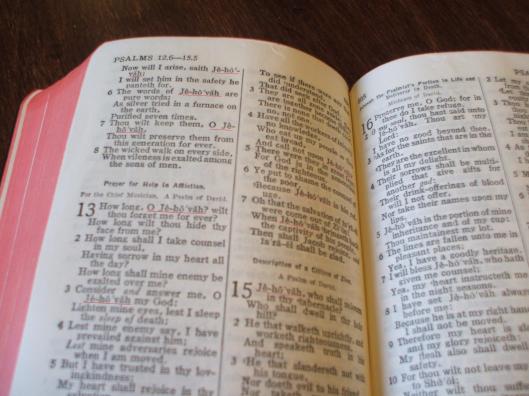Tags
 I like to make breads from different cultures and regions of the world. It’s a sort of armchair tourism for me. I’ve made challah, pitas, and babka, among others.
I like to make breads from different cultures and regions of the world. It’s a sort of armchair tourism for me. I’ve made challah, pitas, and babka, among others.
I could say, “I’ve made Jewish egg bread, pocket bread, and Polish swirled bread”, but it doesn’t have the same ring to it.
More than that, it isn’t as precise. I’m a writer. I believe in the importance of words and choosing the right words for the right things.
I’ve been bothered for some time by the way that most English translations have dealt with the names of God in the Old Testament. The three major terms used in the Hebrew are Elohim, translated “God”; Adonai, translated “Lord”; and YHWH, most often translated the LORD (in all caps/small caps).
No one knows how YHWH was pronounced, but the general agreement is that is was something like Yahweh. It was the personal name of God, not a title like Adonai.
What bothers me is that the actual name has been consistently rendered as the title, with a mere difference in typography to differentiate two words that are completely different in the original language. For years I didn’t pick up on this at all, or was only vaguely aware of it.
The source of the custom is in the Jewish tradition of not pronouncing the sacred name in order to avoid taking it in vain by accident. We as Christians are not bound by those traditions, so it strikes me as strange that most Bible versions adhere to them.
I say most; a few translate God’s name as Yahweh, while a couple use Jehovah. Of the two, my preference is for Yahweh, since it is closer to the original language.
Though the American Standard Version of the Bible used Jehovah, all later revisions of the ASV (the RSV, NRSV, and NASB) dropped it and began using LORD again.
Yahweh and Jehovah don’t come tripping off the tongue easily. They sound a little odd, un-English in the case of Yahweh, archaic in the case of Jehovah. But then, so do a lot of other Biblical names. I don’t believe translation decisions should be made solely because of what people are comfortable with.
Let me be clear here, though: I do not believe anyone’s salvation depends on whether they or their Bible refers to God as “Jehovah”, or “Yahweh”, or “God” or “the Lord”. After all, the New Testament doesn’t refer to God by his Hebrew personal name, nor do we have any recorded instances of Jesus or any of the apostles speaking on the subject.
However, I feel that being aware of the places that Yahweh appears in the Old Testament can add extra depth of understanding to certain passages, especially in public reading, where “the LORD” and “the Lord” sound exactly the same.
See, for example, Hosea 2:19-20, where God is speaking of his willingness to forgive the nation of Israel of her idolatry and enter into a relationship of renewed intimacy.
“I will betroth you to Me forever; Yes, I will betroth you to Me in righteousness and in justice, In lovingkindness and in compassion, And I will betroth you to Me in faithfulness. Then you will know the LORD.”
(NASB)
“And I will betroth thee unto me for ever; yea, I will betroth thee unto me in righteousness, and in justice, and in lovingkindness, and in mercies. I will even betroth thee unto me in faithfulness; and thou shalt know Jehovah.” (ASV)
“I will betroth you to myself for ever, betroth you with integrity and justice, with tenderness and love; I will betroth you to myself with faithfulness, and you will come to know Yahweh.”
(The Jerusalem Bible)
The use of the personal name instead of the title highlights the intimacy of the relationship spoken of, especially in the context of verse 16, in which Yahweh says “You will call me ‘my husband’; you will no longer call me ‘my master‘.” (NIV)
I also think that in a world where people increasingly believe in a faceless “higher power” or follow various New Age, pantheistic, or nature-worshipping religions, that it can be helpful to remember exactly who we serve. Our God is not a vague “higher power”, not a human creation of wood and gilt, not “the god in each of us”, but Yahweh is our God, Yahweh is one! (Deuteronomy 6:4b)*
________________________________________________________
* I took the NASB rendering here and replaced “LORD” with Yahweh. The ASV has the rather redundant but apparently quite literal “Jehovah our God is one Jehovah”, as does the Young’s Literal Translation.
At this point I am using the ASV for studying Old Testament books, because it is the only really solid, somewhat easily available (in print) translation that I’ve been able to find that does not render the YHWH as LORD. It does have two major drawbacks. I am not a fan of the archaic language, and at times they did choose being literal over being intelligible.
Shared at:


Very good article! Thanks for sharing at R 16:16.
Thanks!
Hi Amanda. I love your article! We need to use His name with such caution and with reverence and fear. I get so sad when I see it used so callously! Thanks for reminding us of His Name! He is worthy to be praised!
Thank you! I am especially upset and perplexed when people who call themselves Christians use his name callously.